I hate such shallow pretenses. I’d let the world say what it pleased and show no grief [for a dead husband] if I felt none – perhaps not show it if I did,” and (when Bertie & Charlotte do not reply) “you both know in what way husbands and wives generally live together. You know what freedom a man claims for himself and what slavery he would exact from a wife and you know how wives generally obey. Marriage means tyranny on one side, and deceit on the other, and a man is a fool to sacrifice his interests to such a bargain. The tragedy is a woman generally has no other way of living — Plater out of Trollope, Barchester Towers, uttered by Madeline
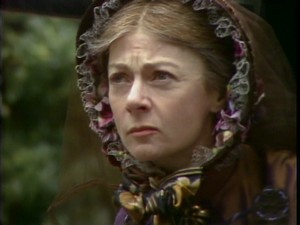
Our first shot of Mrs Proudie, surveying the battlefield as she emerges from her coach — no one will tyrannize over her
Dear friends and readers,
Yesterday I watched all 7 hours of Plater’s Barchester Chronicles in a row. A shoverdose. I was newly impressed by this mini-series based on the first 2 of Trollope’s Barsetshire cycle (6 altogether). Maybe this was the first time I ever watched it during the day. I was using it to try to absorb my mind. And it did, mostly. Only towards the very end when the happy ending became too insistent and maybe the pudding was egged by a slightly overdone final toast to Mr Harding (Donald Pleasance).
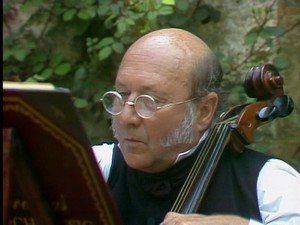
First close up of Mr Harding, POV Mr Bold — Pleasance understands this Trollope type and plays Malachi of Malachi’s Cove as brilliantly
What’s so good is how it combines serious feeling with a kind of light comedy. Because I was watching it on a laptop, I could stop the Application (I guess it’d be called) and contemplate stills. Geraldine McEwan was magnificient as Mrs Proudie: a seething passion to dominate fueled her very body, and she was matched by Alan Rickman, who was not a comic figure but burned with a kind of matching maddened ambition.
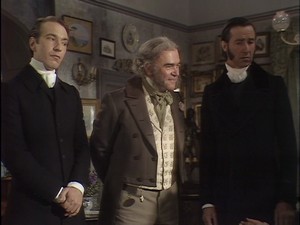
Slope at far left assessing Madeline; at far right Arabin, who does not try to conflict with her
Near its final moments he wishes Mrs Proudie and the Bishop to go on being alive the way they are forever. One theme of this film adaptation was ambition: so many of its scenes are characters discussing who is beating out who for what?
Against them is Donald Pleasance inimitable as Mr Harding whose lines are so delightful because they refuse to play this game — and he gets away with it. He would rather be destroyed quietly. He will resign the Wardenship because he’s in the moral wrong to hold such a large salary and the men he cares for have such a pittance. He will not take the deanship because he’s not fit for its duties, to which Nigel Hawthorne as Archbishop Grantly bursts out with a quivering anxiety of desire: what duties? there are none.
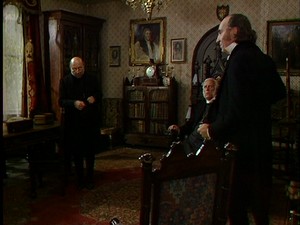
Discussing how to cope with a newspaper article (a serious matter): don’t answer it says Grantley and as a tactic it’s the one which can win if you have the safe position
Elaine Showalter says Barchester Towers is the first academic faculty satire and certainly that’s part of the mix. Walking away, resisting what will destroy you because the price for whatever it is is too (in terms of ego needs) is the tragic pattern of The Warden, whose references are jobs we can do without because we have some other minimum of support, in the warden’s case his small sinecure in the city. He is willing to take a step down, lose of pride and shallow admiration by others to save his sleep as he’s not got the rhineroceros skin getting on in this upper middle class world of privileges demands.
Erotic. How erotic it was too.

It’s not clear who suggests the walk, but it’s probably Bertie as Madeline cannot go — she has but one leg (marital abuse)
The central presence here Susan Hampshire as Signora Neroni, supposed to be the cynical perspective on what motivates everyone. She has had some real hard experience of marriage — and it’s not been pleasant. She is in the end very nasty to Rickman-Slope, humiliating him, exposing him spitefully. She’s a match for Mrs Proudie in this. She and her brother, Peter Blythe (well named) as Bertie Stanhope and Susan Edmonstone as Charlotte are without the usual ambition to rise and to make money but they are not without a desire for pleasure all the livelong day and they do it by living off their father who has one of these unjustifiably large incomes — and by using others. The close of one part ends in a moonlight walk with Janet Maw as Mrs Eleanor Bold, whose lines and feel are taken directly from Trollope’s Barchester Towers.
But they are not quite harmless. One should not marry Bertie Stanhope who no matter how innocent he seems, is not. His lines reminded me of Dicken’s Skimpole (Bleak House) and when they echoed by Mr Harding who also says he’s a child when it comes to money, knows nothing of it, we are to realize the uttered stance has to be unreal, hypocritical at some level.
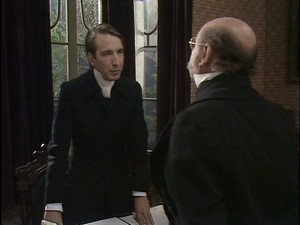
The interview: Mr Slope hazing Mr Harding — pray tell reader have you been on many interviews (I’ve endured 16, got the job, such as it was 8 times)
Yes the piece is a produce of Alan Plater’s pen, David Giles’s direction (uses caricature at high points) and the uncompromising costumes and production design of Jonathan Powell (who did the 1979 P&P this way), with the art of Juanita Waterson (costumes) and Chris Pemsel (basic design). Very picturesque fairy tale use of closely accurate costumes of the genteel classes of England in the mid-19th century.
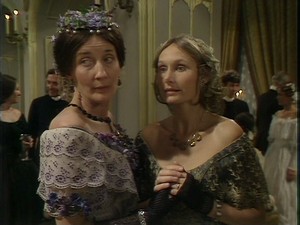
Mrs Vesey Stanhope & Susan Grantley family matters (aka Phyllida Law, Emma & Sophie Thompson’s mother; Angela Pleasance, Donald Pleasance’s daughter who is seen in much of BC eating her morning cereal with a long gold spoon)
This could have been and today make for a non-modern feel that will lose the series watchers. But all this emanates from Trollope’s Barsetshire vision which is about (among other things) the inescapability of ambition, erotic take-overs and sexploitation (I did use that word), with just these characters. Its Christianity is equated with selflessness, really giving to the other person what he or she wants (hoping what he or she wants will not be destructive), respect for the other or others, caught up in music which is presented as asking nothing, only giving an experience of beauty (“if you like music” says one of the sceptical old men).
This continual undercutting is Trollope too.
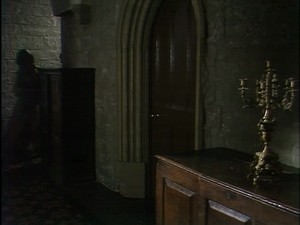
Her husband, having given up his job, Mrs Quiverful rounds the bend in her quest to get it back
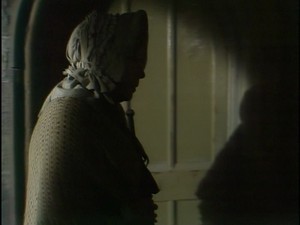
Mrs Quiverful at Mrs Proudie’s door — Mrs Bold too goes forth to fight for a man (her father; her hysterical appeal is made to Mr Bold)
Watching it mostly at night, only one part at a time, I concentrated more on — remembered as true the moving scenes of Maggie Jones as Mrs Quiverful doing battle on behalf of her “soft yielding” Mr Quiverful (Jonathan Adams). How desperate they are for, in need of money (14 children is their cry). How eros has done for them. They are the farmost edge of the themes’ continuum. They are easy to notice and as imitations of life feel for. Obvious. Watching it straight through — say Part 4 — one could see suspended an interweave, a kind of dance of couples just after the Stanhopes are introduced into the mix, really engineered by Mr Slope’s maneuverings. It’s then holding the film still and watching gestures and movements and react to them as true cores of emotion, kept private, only given social expression indirectly or silently.

Note the gravity of Janet Maw’s expression as she rightly rejects Bertie Stanhope (who does need her money)
A young lovely Barbara Flynn provides undercutting calmness — as there is a calm center in Trollope’s books. He remains calm in the face of what he observes as it is sort of droll. It’s not that she takes an Olympian perspective, she’s too realistically wry for that.
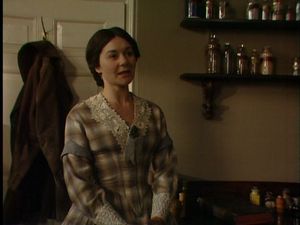
“Why Mr Harding?” Mary asks her brother, and answer comes there none because reason is, Mr Harding’s vulnerable, in reach
What you don’t notice at first is how she (like Mr Harding) does not participate in personal ambition or a ruthless or needy quest for erotic love. And she too is taken care of as Barsetshire is this idyllic place where everyone is taken care of (as long as they can give up pride at judicious moments). Other pastoral figures in the wistful line are Miss Ullathorne and her brother who live together, keep away from life’s battles, be they erotic love (the sister) or social gamemanship (the brother says he can’t take too much socializing).
It’s not that there is no chance of ultimate loss. People die in Barsetshire. (Stories where no one dies or people can come back from depth cannot have life’s emotions since these depend on knowledge life must come to an end.) But when they do, we are to rejoice at their achieving peace — here we slip reality altogether — except for those who need people to die at a particular moment in order to gain some advantage or place from someone else just then in power. The other end of this (upending death) is the pastoral tournament where a local countryman, young Greenacre (unfortunately not listed on IMDB) takes the lists and falls off his horse immediately, nearly breaking his head – but not quite. Mr Plomacy needed Greenacre to do this to please his lady boss, Miss Ullathorne at that moment, to keep his job. A delightful moment is when Eleanor Bold comes upon him and Bertie with glasses of wine and beer in the grass. It’s matched by Mr Harding at the bedside of the dying, seeing them out as it were.

Mr Harding seeing old Bishop Grantley (Cyril Luckham) out
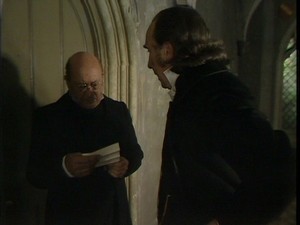
On the other side of the door of the now dead man, Archbishop Grantley ready with the telegram to send to the PM to see if he can get his father’s position: Mr Harding must take it to the post office as it would not be seemly for Grantley …
But I myself did not want to see anyone out. I wanted the man I care most for in life to live and he was being helped to fight for his life by a team of people not far off in an operating room, cutting out a cancer in the middle of his body, the lower esophagus, just above the stomach. This was not novel art. In reality Alan Plater, a great screenplay writer (he did Fortunes of War from Olivia Manning’s Balkan Trilogy which I’ve just now started), died recently. His is the sort of art that I love and wish were more respected: the art of the TV playlet where the TV experience’s strengths are understood.
I had brought a book with me for the day I had to get through but found I could not read. Trollope’s books, especially once in Rome, The Last Chronicle of Barset had seen me through a strained holiday, but the stress of what I was trying to keep on the top of my mind under control would not permit me to lose my mind altogether to conceive thoughts and images. I could only let them in ready-made (as it is in film-taking in). Plater is dependent on Trollope for his concoction.
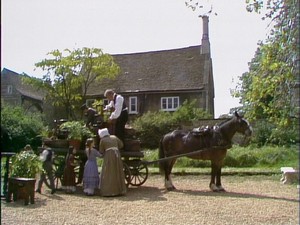
Mr Quiverful having got the job, the family moves — near the close of the film; it’d been better if it had been the close
I stopped watching only for short trips for food — we went to Starbucks for coffee and croissants (and a hot breakfast sandwich) and Noodles and Company for bowls of spicy spaghetti (and for Laura a juicy-drink, and for me a glass of white wine).
Ellen

Perhaps Jim will enjoy watching videos during his recovery.
I am so glad that Jim is recovering. You are both very brave. Love, Caroline
Forced to act this scene, Caroline. We are hoping for life for him. In previous times — a number of years ago now – I bought Jane Austen for an umpteenth read. Now we have computers and DVDs and I bring film adaptations. I had Barchester Chronicles on my laptop; also the 1995 Sense and Sensibility. They are there as particular favorites.
It is draining but of course there’s nothing we won’t do to keep him alive. This was a tremendously high tech operation — they used a robot to sew parts of my husband back together after they reformed two organs. Very daring but he’s weathering it thus far.
Waiting through a loved one’s long operation is especially hard Ellen, and you could not have better company than Trollope’s Barset novels to see you through. May I recommend the Palliser series on dvd to help carry you through those first days of recovery and then possibly The First Churchills to see you through the week? Then, once at home, there is the bbc series The Grand; I think you will expecially like the way a “working woman” comes to support herself in older age. These all feature Susan Hampshire playing the role of a smart woman/resourceful woman, by the way.
Hopefully the worst is now behind you and Jim, and you will be able to start planning a wonderful walking tour of the Cotswolds soon. Meanwhile, may the recovery go smoothly – and thank the Lord Trollope was so prolific!!
Elissa
Hi Ellen,
I Hope your husband recovers well from his marathon surgery and that the treatment was completely successful. Give him my best wishes please. I have a friend whose husband is going through the post cancer surgery period too so I am seeing first hand how stressful and emotionally draining the process is. A rollicking good novel is always a place of refuge for me in times of stress. Even old favourites can be reread and reveal subtle nuances of character, place and narrative which I have previously glossed over. The very best novelists create another world in which we can immerse ourselves, for a time at least.
regards from vicki m
Jane Patsakous: I am going to watch this again. It is a fine production
Donald Plesance also played Malachi, and Graham asked how might one view Malachi’s Cove?
Me: Good question. I have never seen an American video cassette. What we owned was a British one which worked on a DVD player that was international: it played video cassettes meant for different regions. When the machine went, my husband converted the tape into an MP2. And that’s how I watch it. I can’t share the file either; or least we don’t know how to do it. When I wrote about it here, I was writing about the MP2: that’s why the stills are so blurred.
E.M.
Susan Hampshire was a top star in these mini-series the later 1960s and early to mid 1970s. I’ve noticed she resembles a type one sees in 19th century illustrations — as does Celia Johnson (famous movies include In Which We Serve, Brief Encounter).
Thank you for the good wishes, Elissa. Long walks are a long way off but we hope they will come again.
Jane Woolley: “I am the happy owner of the series! Wonderful, shift-into-another-happy-world stuff. I don’t feel silly making up that adjective, because I have never heard of ‘shoverdosing’ before!”
Me: Shoverdosing is a new word! for a new thing. People can at will “binge watch”; they can at will select what they want to watch and when they want to watch it because of new applications in computers and DVDs. Hence a new word for a new phenomenon. The Way We Watch TV now has changed. Barchester Chronicles remains a TV mini-series with its art directed at the small screen, so when I watched the whole 7 hours in a hospital lobby waiting room I was still watching TV.
E.M.
Glenn: “I will watch it again one day (before I die).”
Jane commented on Rickman’s performance, interchanging the names Snape and Slope:
Me: The role was central for Alan Rickman’s career. It brought him to public attention but he had studied at the Royal Academy of Dramatic Art (an important part of an acting career still) and was a growing “presence” on stage. Then he made it into commercial film in the later 1980s. I’ve never seen any Harry Potter films; is Snape anything like Slope?
Glenn: “Alan Rickman is terrific in the Potter films. I would go so far as to say that he is one of the 3 best actors over the 8 films, possibly because his character is so unusual – full of contradictions but true to life.”
Is Snape anything like Slope? I do like his Madly film very much. Like Pleasance, he can encompass many different types (including Valmont and Antony to Helen Mirren’s Cleopatra) — as can Geraldine McEwan. She plays poignant, lost women too and reads for some of the Audio CDs MP3s (once audiocasettes) wonderfully well.
E.M.
Paul: “I enjoy Rickman’s performance as Slope, but he isn’t QUITE the Slope I imagine. I see Obadiah as Tony T’s version of Uriah Heep–greasy, obsequious, grinning. . .whereas Rickman plays him as cool and calculated. Again, though, it’s a fine performance.”
Me; To me Rickman made the character far more acceptable. Except insofar as later in the novel Trollope begins to identify with Slope as an outsider, the rest of the portrait captures what makes Trollope awful — everything even loathesome. Like Davies in quite a number of his adaptations, Plater and Rickman together rescue Slope — and Trollope — for me. A strong erotic component is added too. If you study the actual lines Plater gives Madeline and compare them to Trollope’s, you find all the misogyny erased, and instead a fully humane portrait where her spite is understandable.
The central presence here Susan Hampshire as Signora Neroni, supposed to be the cynical perspective on what motivates everyone. She has had some real hard experience of marriage — and it’s not been pleasant. She is in the end very nasty to Rickman-Slope, humiliating him, exposing him spitefully. She’s a match for Mrs Proudie in this. She and her brother, Peter Blythe (well named) as Bertie Stanhope and Susan Edmonstone as Charlotte are without the usual ambition to rise and to make money but they are not without a desire for pleasure all the livelong day and they do it by living off their father who has one of these unjustifiably large incomes — and by using others. The close of one part ends in a moonlight walk with Janet Maw as Mrs Eleanor Bold, whose lines and feel are taken directly from Trollope’s Barchester Towers.